Café Pacific
How ironic. For two days this week, veteran Pacific affairs correspondent Sean Dorney from Australia Network was contributing hugely to an inaugural regional business media summit organised by the Asian Development Bank.
His final contribution to the seminar was a rundown on “tunanomics” and how illegal fishing was, for him, the biggest economic story confronting the Pacific.
He punctuated this presentation with an ABC video report from 28 October 2013 which exposed how lack of cooperation by at least six Pacific countries was undermining the Forum Fisheries Agency’s surveillance efforts.
Anthony Bergin, the Deputy Director of the Australian Security Policy Institute, estimates that about US$1.7 billion is lost through illegal and unregulated fishing activity in the Pacific. He’s proposing that the Australian patrol boat programme should not only be a Defence Department commitment but that Australian aid should also contribute to the programme now being developed to replace those 22 patrol boats that Australia has donated to Pacific countries but which are coming to the end of their work life.
No sooner than his fine contribution and the ADB seminar was over, Dorney found himself in the gun again with Fiji media “control freaks” — Dorney’s description — who seem determined to use the controversial 2010 Media Industry Development Decree to gag anything deemed to be “un-Fijian”.
And this seems to include every shred of criticism from the foreign media.
Although this issue never really made it to the floor in this media seminar, there was a lot of muttering behind the scenes over a complaint of alleged bias by Dorney in his reporting from recent Pacific Media Summit in Noumea, New Caledonia, sent from the decree bureaucracy octopus MIDA (Midas would be more apt after the Greek mythological king who turned things to gold but ended up dying of starvation).
MIDA, or the Media Industry Development Authority, was supposed to be the new media accountability agency that was going to oversee media freedom and freedom of expression and usher in a new era of political discourse and discussion leading to the 17 September 2014 general election.
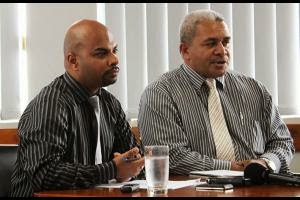
Instead, the chief MIDA moguls, USP academic Ashwin Raj and former Pacific Islands News Association (PINA) general manager Matai Akauola, have set themselves the task of finding ways to zip-up foreign journalists (and more than a few locals).
Both men are pleased with the existing blacklist topped by Dorney (ABC – Australia), Barbara Dreaver (TVNZ – NZ) and Mike Field (Fairfax Media – NZ). But they don’t want it to end there.
More names are wanted for the banned list, and the ABC’s Campbell Cooney has also been mentioned for a “dishonourable” recommendation.
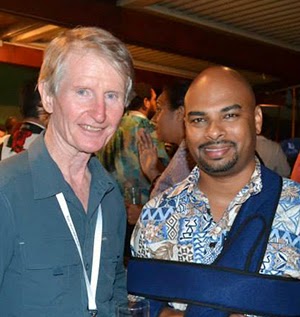
in Noumea . . . happier times? Image: Unnamed paparazzi
What did Dorney say in his Noumea report that was so “offensive”? Well, for a start he merely said that “there was a general feeling that there is not much media freedom in Fiji”.
And MIDA wants a retraction from the ABC? Hardly.
At the MIDA media conference announcing the establishment of a “bias” monitoring unit, Raj was reported to have told Pacific Freedom Forum (PFF) coordinator Ricardo Morris he would have to choose between being a journalist and an advocate (he is also editor of the monthly news magazine Republika).
Morris defended the right of journalists to speak out for themselves on media issues.
Café Pacific publisher David Robie branded the MIDA media tightening up development as “mind-boggling” at a time when MIDA should be pulling out all stops to restore a vibrant and fearless political debate in Fiji during the return-to-democracy election campaign.
Back at the ADB media summit in Sydney: This was an excellent occasion for all 20 senior media people from eight countries who took part and was a reminder of how constructive things can be when the divisive political baggage is left at the door.
As well as Dorney, a relentless critic of PINA, there was PINA head himself, president Moses Stevens, from Vanuatu, who appealed to the ADB to assist Pacific media to face “the challenges of infrastructure, manpower and the business aspects of our industry”, and the deputy chair of rival Pacific group Pasifika Media Association, Kalafi Moala of Tonga.
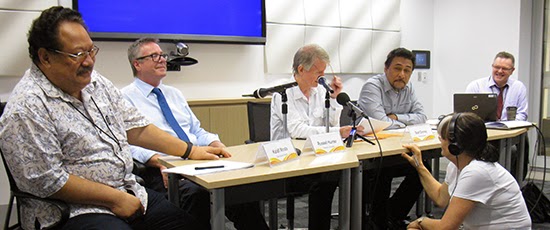
Moala again had a message of “collaboration” for the Pacific media.
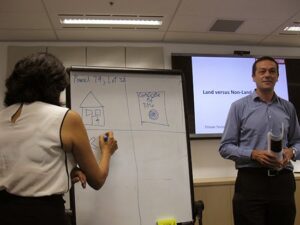
bank security to land title. Image: David Robie/PMC
The opening day was focused on the ADB in Pacific development; the Pacific economic outlook; the private Sector Development Pacific Initiative aimed at building up the business environment in the region; and the A$1.3 billion Pacific Region Infrastructure Facility.
The final day was instead directed at media issues, such as the Pacific media business outlook; “coconut wifi” with internet, mobile and digital technology changes; gender and business; and a lively final session discussing the region’s “biggest stories”.
Café Pacific found business law reform specialist Aaron Levine’s session on the online Company Register initiative in the Solomon Islands and in other Pacific countries especially innovative in a region where only one island country — Cook Islands — has a Freedom of Information law.
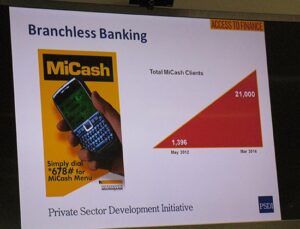
A presentation on village banking and mobile banking in Papua New Guinea, a country that has a low density of bank branches and ATM machines but high uptake of mobile phones was also intriguing.
Among issues reported on by Pacific Media Watch:
The “human tsunami” of lifestyle diseases will overshadow climate change and other big Pacific economic stories for some countries, a regional conference has been told.
“The climate change story – while it is real and huge – will be overshadowed in Samoa by non-communicable diseases,” Talamua publisher Lance Polu said.
He described the crisis as an economic and health “human tsunami” at the two-day inaugural ADB … summit in Sydney. Other speakers said the crisis also affected several
Pacific countries, such as Tonga.
Diseases caused by a huge shift in lifestyle and diet has caused obesity, high blood pressure, diabetes, kidney failure and heart conditions, according to Polu who cited research reports.
“The heart of the problem is the shift in diet to a domination of imported processed foods like chemically grown chicken, fat-infested turkey tails, low-grade tinned fish, sugary fizzy drinks and much more,” he said.
“And we keep on importing them and returning only empty containers so they can fill up quickly and be sent back again to make our people even more sick and kill our productive populations at a very young age.”
Polu gave an example of the death from lifestyle disease in the past three months of two young Samoan chief executives of government ministries – one aged 45 and the other 50.
Bankruptcy risk
“The problem for us is so serious, some medical experts predict it will ultimately bankrupt our country in the near future,” Polu said.
We’re struggling to keep two dialysis units going to treat the number of kidney patients and the cost to the economy is enormous.”
Polu said the key was “information, public awareness and continuing education”.
“The media plays a hugely important and a vital role in this process to change attitudes and lifestyle. And it takes time and money.”
He called on the Pacific Islands media and ADB to consider a collaboration project on the issue because health had a major impact on sustainable growth in the region ….
Climate change topped the anecdotal list along with corruption; social justice and human rights; resource extraction industries such as logging, mining and fishing; asylum seeker economic packages; and changing political climates, such as with Fiji preparing for a “return to democracy” election later this year.
Rights violations
Pacific Media Centre director Professor David Robie said the worsening human rights violations in West Papua were likely to also have a serious economic impact on ventures such as the giant Freeport McMoran copper mine after the presidential elections in Indonesia next month.
Indications are that elections could result in a leadership change that may be even worse for the people of West Papua,” he said.
Dr Robie praised Vanuatu Prime Minister Moana Carcasses Kalosil for the “only principled stand” over West Papua by a Pacific leader in recent months with his outspoken speech at the United Nations Human Rights Council.
Representatives from Fiji Television, Fiji Sun, Fiji Times, Matangi Tonga, Solomon Star, Taimi Media Network, Talamua Media Samoa, PNG’s National Broadcasting Corporation, Pacific Islands News Association, Asia Pacific Journalism Centre, Pacific Media Centre, and the Australian Broadcasting Corporation took part.
- Lifestyle ‘human tsunami’ threatens Pacific as biggest economic story
- Illegal fishing in the Pacific dwindling tuna stocks
- Senior Pacific media gather in Sydney to talk business
- The MIDA and ABC correspondence files — Fijileaks
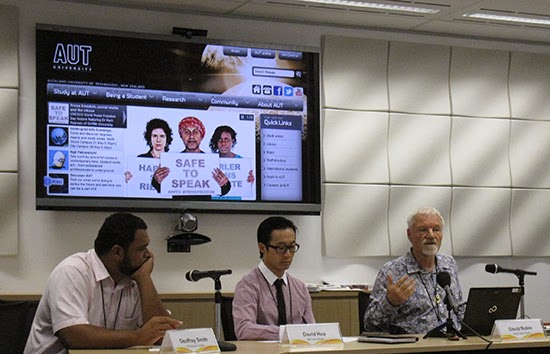
This article was originally republished on the Cafe Pacific blog.

